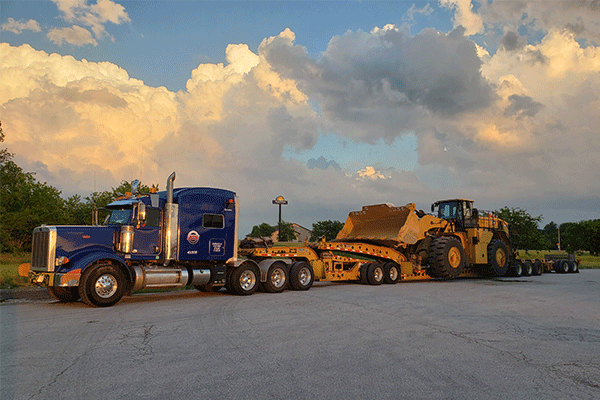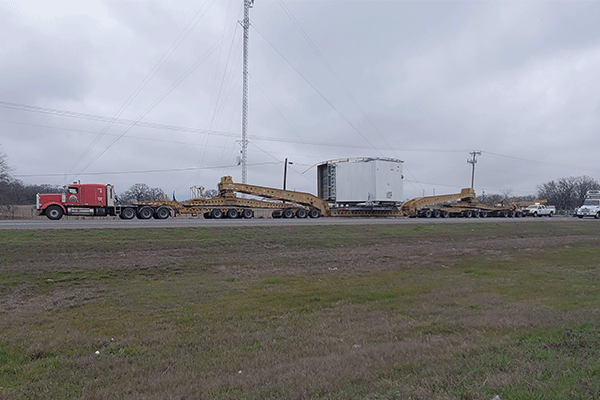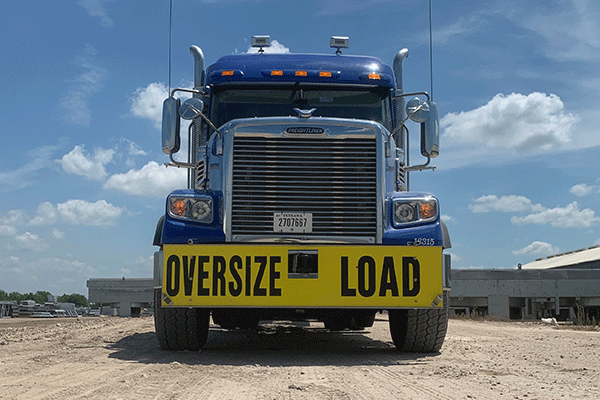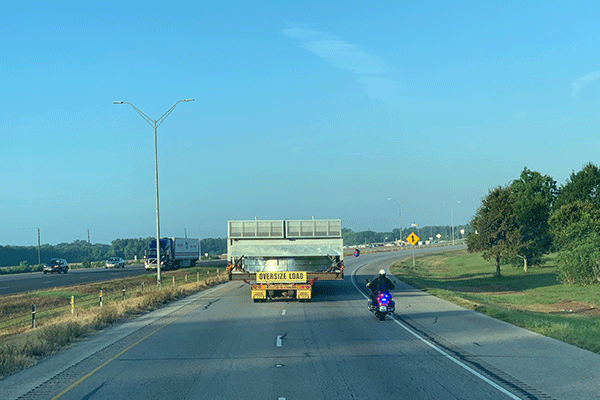
Heavy haul trucking couldn’t be more important to your supply chain. And, no matter how big or what it is, that boiler, generator, tank or piece of large machinery, needs to get to its destination — preferably in one piece.
Your job is to ensure a successful — and cost-effective — heavy haul transit. So you're here looking for a bit more information on what you should expect to pay.
Understanding your trucking cost is key to making the most of your budget in what can truly become a cash-intensive endeavor.
Here at ATS, we’ve been offering heavy haul trucking services for decades so we know a thing or two about pricing them correctly.
That said, too often heavy haul transportation providers don’t explain the price their customers pay as fully and transparently as possible. And unfortunately, this leaves the shippers working with these companies at a decided disadvantage.
We take pride in breaking this mold by fully educating the shippers we work with.
In this article, we’ll fully articulate the factors that impact the cost of doing business in the world of heavy haul trucking and leave you with some tactics to make your next haul as successful as possible.
You came here looking for heavy haul pricing information so, without further ado, let’s jump right in. . .
How Does ATS Price Your Heavy Haul Freight?
Before we begin talking about the costs associated with heavy haul trucking — a topic we’ll cover in full, I assure you :) — you should understand one aspect of working with ATS specifically — and a practice we call “all-in pricing”.
You see, many heavy haul transportation providers give their customers an initial price, calculated based on what the shipment will cost. . . but not really.
Some carriers consistently come back needing more money as additional costs surface throughout the course of the shipment — costs that were not transparently stipulated upfront.
In many cases, these companies are able to offer far lower upfront costs than if they were to give “all-in” prices but end up costing more on the back-end.
By “all-in” pricing we mean that the rate you’re given by the experts here at ATS includes all of the costs needed to complete your shipments. Nothing will change following successful delivery. Our prices are accurate and we’re confident they’ll do the job.
Heavy haul trucking is a complex business that many times feels more like a puzzle than anything. As true experts in this industry, our “all-in” pricing won’t let you down as you’re given a rate that fully reflects the cost of doing business.
How Are Heavy Haul Rates Calculated?
Heavy haul trucking is far more intricate than many other forms of shipping. Moving these massive pieces of freight takes ample caution and plenty of planning. For this reason, every shipment is unique.
As such, the cost of moving your freight will be calculated by accounting for its individual requirements coupled with fluctuations in current market conditions.
That said, for heavy haul freight weighing up to 100,000 pounds, using this formula should give you a pretty clear ball-park for estimating your price:
| $1 X # of Axles Needed X # of Miles Your Freight Must Travel = Your Price |
For example, should your 70,000-pound boiler need transportation from New Orleans, Louisiana up the road to Indianapolis, Indiana — a trip of just over 800 miles (819) — your cost formula would look like this:
| $1 X 7-Axles X 819 Miles = $5,733 |
Pretty easy right?! Although your price may be a bit more, or less, than whatever dollar amount this formula spits out, it’s highly effective for calculating base estimates for the cost of heavy haul transport.
For freight weighing more than 100,000 pounds, however, plug-and-play formulas like this one don't work as well. The intricacies of these larger shipments simply can’t be accounted for as succinctly as smaller heavy haul freight.
In a nutshell, as soon as a load hits one or more of the following criteria, things get a bit more complicated:
|
|
|
|
As soon as these parameters kick into effect — and the load in transit starts to need special requirements — seven factors begin influencing the overall cost of getting it moved.
These factors, impacting the cost of heavy haul trucking are:
- The uniqueness of the trailer used
- The timeframes/shipping urgency
- Permits needed
- Utility service requirements
- Escort service requirements
- First-run surveys
- Engineering surveys
Let’s talk about the part each of these requirements plays in the final “all-in” freight rate you pay for your heavy haul transportation.
1. The Uniqueness of The Trailer Used
Heavy haul trucking, though an important part of the transportation world, is certainly a challenge to get right. And, as soon as freight weighs more than 100,000 pounds the type of trailer needed to haul it becomes increasingly more specialized.
And boy, are there some specialized trailers available.

From 10-axle trailers suited to haul freight ranging from 105,000-125,000 pounds to 20-axle dual-lanes for freight up to 340,000 pounds and everything in between, there’s a trailer available for just about anything.
That said, the more specialized a trailer becomes, the more you should expect to pay for its space. In fact, some of the most specialized trailers are incredibly expensive to own and drive the price of using them through the roof.
The reason for these price hikes is directly tied to supply and demand. And, as the supply of the trailer type needed drops, you’ll need to pay more — as you’re competing with other shippers to use it.
For example, should your freight require a 19 to 28-axle trailer — a trailer that is incredibly uncommon — expect to pay a higher price than using a traditional 8-axle solution.
2. The Timeframes and Urgency of Your Shipment
Just like every other service offering in the transportation world, the price of securing a truck, trailer and driver for your freight increases to match your urgency. Although the sheer nature of heavy haul trucking requires ample planning — especially for larger loads — needing a solution quickly will end up costing more.
Giving your provider a one-week lead time to find a solution to move a 120,000-pound generator from your facility and plan its transit will cost far less than giving them two days to do the same.
Even though your timeframes may be tighter the planning and coordination required to safely move your freight hasn’t. Your provider will need to work overtime to slip your freight onto the jam-packed schedule of an area trucker with the expertise to properly haul your load.
Additionally, giving your provider less lead time makes it harder on them as they work to alert authorities, secure permitting and plan a route.
If you’re hoping to save money on your heavy haul freight costs, you’ll need to control what you can. It’s difficult to control the size of your freight, the number of states it travels through and the cost of permitting in each.
The only thing that’s truly easy to control is planning. Budgeting your time and giving proper lead time will go a long way toward maximizing your heavy haul shipping budget.
3. The Permits Your Freight Needs ($200-$500 per state)
Permitting for heavy haul freight can get expensive as it can be done at three separate levels: state, county and city. Depending on the specifics of your freight’s route, your provider may need to obtain any number of over-dimensional (OD) permits.
As you may suspect, permitting a heavy haul load can get expensive, especially as the number of states, counties and cities it needs to go through increases.
These permits can range from $10 to $500+ depending on the size of your cargo (weight, height, width, length) and the area(s) it’s traveling through. As the size of your shipment increases, the complexity of the permitting required will increase to match.
In actuality though, the cost of purchasing a permit for heavy haul freight is not consistent from one state to another. Some Midwestern states charge one consistent fee for OD freight no matter how large or small.
By contrast, many other states calculate the rate of these permits by the ton. As a result, permits for loads that are slightly OD may cost $100 while permitting heavier shipments costs thousands.

No matter what your freight requires, you’ll want a transportation expert on your side to assist you through the permitting process — which varies by state.
As important as they are, these permitting costs can get confusing. Leaning on the expertise of your partner will help to ensure your load gets moving on schedule.
Note: our “all-in” pricing takes into account these per-state permitting costs to leave you with a firm rate to rely on and plan for.
4. Utility Service Requirements ($2,000-$4,000)
Some heavy haul loads have dimensions that require utility services to lift telephone wires and hold movable street lights (and other obstacles) out of the way.
Although competent providers will select the best possible route to get your freight to its destination, sometimes the “best route” is still difficult to maneuver.
In these instances — when the sheer height, length or width of a load makes transportation difficult — utility services are employed to make room for a shipment.
The cost of these services and the people that perform them varies based on the requirements of each job.
Should a single telephone wire need to be lifted to prevent a halted haul, the rate charged for doing so may cost a day rate of around $1,200.
In more extreme instances, expect to pay upwards of $4,000 to keep freight moving.
Like anything else, the price of these services is based not only on the intensity of the job at hand but the supply of professionals in your load’s location as well. If you need someone to move a telephone wire in Bayfield, Wisconsin (population 490) you’ll pay more to find someone in the area capable of doing so.
This is, once again, is where proper planning can help you save on your heavy haul cost. The companies that provide these services are in high demand which makes scheduling their services in advance crucial. Calling utility providers at the last minute often leads to huge wait times of what can be two, or more, days.
Massive delays spanning days (or more) can be damaging to your bottom line and destroy your heavy haul timelines. As such, the more time your provider has to arrange utility services for your freight, the better.
Inconvenience comes at a price, especially when moving — already disruptive — heavy haul freight.
5. Escort Car Service Requirements ($2 per mile)

A heavy haul shipment’s escort car service requirements once again vary from one state to the next. These pilot cars are charged with leading and following over-dimensional freight as it makes its journey onward.
There are several types of escort cars. Overly tall loads, for example, are required to be behind what is known as a “Height Pole Car”. These cars use the extendable pole attached to their front bumper to measure the height of upcoming bridges and overheads in anticipation of this freight.
Although the requirement of escort cars varies by state, you can expect to pay an additional $2 for every mile that freight escort service is required.
Some freight — such as loads so big that they restrict traffic— need to be accompanied by local and/or state authorities. Even though only a very specific type of heavy haul freight meets their requirements, police escorts are not cheap and will impact your price.
6. First-Run Surveys ($3,000-$5,000)
Just like how every heavy haul shipping project is unique, the routes used to do so also vary greatly. As a result — when your transportation needs are comprehensive and your load is well oversized — first-run surveys must be utilized.
On the whole, first-run surveys are performed to verify that a shipment can proceed as planned. Since states don’t guarantee that all overheads are tall enough and all openings are wide enough for any given shipment, these surveys can’t be avoided.
During these surveys, routes are checked for height and width restrictions and adjustments are made before the load ever arrives.
These surveys are truly vital for checking the validity of a specific route and avoiding incident before it ever occurs.
The price of first-run surveys is directly tied to the number of miles a shipment is traveling — the distance that needs "surveying."
Should a heavy haul load need transportation from Baltimore, Maryland to Pittsburgh, Pennsylvania, surveying these 247 miles will cost far more than if it was moving from Baltimore to Nottingham 18.4 miles away.
7. Engineering Surveys (around $3,000 depending on the state)

Engineering surveys are the rarest heavy haul service on this list. But, should they apply to your shipment, these services can make a real imprint on your bottom line.
You see, many of this nation’s bridges simply aren’t designed to bolster 250,000+ pounds of freight as it traverses their surfaces.
As such, for heavy haul freight where weight is a real concern, engineering surveys are necessary to ensure that every man-made structure in its path can rise to the challenge.
More than anything else, safety is important in the heavy haul world and the engineers providing these services are key to keeping everyone safe.
That said, the price of these services can be hefty as they require a very fine level of expertise and a large time commitment from the companies providing them. Additionally, in states where only a limited number of firms are approved to provide engineering transportation services, the cost of employing this expertise rises.
Always expect to pay more when engineering services are necessary and when they are, these costs are unavoidable.
Heavy Haul Trucking Doesn’t Have to Break The Bank
Here at ATS, we price heavy haul freight "to execute". This is the dollar amount — based on the specifics of your needs — it’ll take to get the job done correctly.
To stick to this promise, we maintain an internal database of up-to-date pricing information that outlines factors such as:
- Permit costs by state, county and city
- Dimension restrictions by state
- Cost of escorting services by state
- Current DOE fuel pricing
- Fluctuations in market pricing
By consistently updating this database and leaning on decades of expertise to boot, you can rest assured that the neatly wrapped freight rate you’re given won’t change.
Your goals, timelines and budget matter to us greatly and heavy haul trucking rates can be difficult to understand.
If you’re ready to receive your exact heavy haul trucking price, request a quote today! We’re ready and eager to assist you in any way we can.

